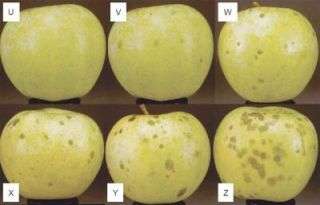One bad apple: Consumers prefer perfect produce

A research study published in the October 2007 issue of HortScience found that consumers don't like blemishes—on apples, that is. The study of consumer values led by Chengyan Yue, PhD, Assistant Professor of Horticultural Science & Applied Economics at the University of Minnesota-Twin Cities, found that low tolerance for cosmetically damaged apples impacts consumers' purchasing decisions.
The study looked at consumers' preferences for either organically or conventionally grown apples to gauge buyers' tolerance for blemishes and other "cosmetic" defects. The findings were clear: when given a choice between organically grown apples with surface blemishes or conventionally grown apples, consumers prefer the conventionally grown apples because they "look better". Even though consumers understand that spots are merely a cosmetic problem and do not affect the taste or quality of the apples, buyers prefer apples with a better appearance.
Consumers in Midwestern markets were surveyed to determine their preference between cosmetic appearance and organic production methods in terms of their willingness to pay for organic apples in the market. Results showed consumers will pay a premium for organic production methods and for apples with low amounts of cosmetic damage. "Consumers have limited tolerance for very blemished apples and they tend to discount production technology attributes in favor of cosmetic appearance. Better understanding of this trade-off can improve organic producers' decisions about disease control.", Yue stated.
Dr.Yue explained the background for the research, noting that organic apple producers must control weeds and monitor and respond rapidly to harmful diseases and insects. Unlike producers who use conventional growing methods, proponents of organic growing methods are limited in the ways they can utilize weed management and pest control. "While there are higher costs and risks in organic production, the additional income from the higher price of an organic product may be appealing. But organic producers' limited methods of control may produce apples with cosmetic damage, which consumers may discount in the marketplace.", he said.
Results from the consumer study have important implications for apple and other fresh fruit growers. The relatively low consumer acceptance of cosmetically imperfect apples narrows the margin of error and presents challenges for organic growers. Organic apple producers must account for the trade-off between production technology and cosmetic damage in their production decisions. Yue observed that, in addition to improving management methods and using inputs effectively, taking more care in preparing apples for sale may also provide producers with opportunities for improved presentation of cosmetically damaged apples in the retail market.
To help organic apple producers market their crops, researchers suggest implementing additional marketing and promotional techniques, such as including recipes and tips for using and storing apples. Labeling apples "locally grown” also spikes consumer interest. According to Yue, apple growers who take careful measures to improve product appearance will see increased consumer confidence and sales.
Source: American Society for Horticultural Science





















